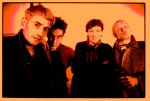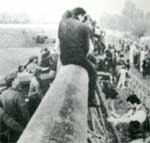 | |||||||

|
slawterhaus a chance meeting |
|
|
In 1987, the band Slawterhaus was formed, a combination of West and East Berliners in the then divided city. It gained a fast reputation for a unique blend of Free improvisation with Noise and Rock elements first in the former DDR, then at jazz festivals in Europe and North America. Dietmar Diesner - saxophones, electronics Johannes Bauer - trombone Peter Hollinger - drums, percussion Jon Rose - violin, 19 string cello, keyboards This is the cover text from the SLAWTERHAUS Victo CD 013. (translated from the original high German by Olga Zeglinski in 1988) SLAWTERHOUSE, sometimes spelt SLAWTERHAUS can be translated as KRAUTSALATHAUS but it could also be phonetically understood to be at least similar to 'Schlachthaus'. However, 'La Maison d'Abattre' seems to be one step beyond cultural neurosis and could well have been used in their North Amercian Premiere at Victoriaville, Canada except that it would never catch on with the New York 'House' trends currently being ghetto blasted down every Avenue. But, the blood and guts of the building industry does not concern us here. What is much more relevant to this discussion is perhaps to pose the question - why does Dietmar Diesner live in a box as opposed to the more usual practice of habituating in a house? This all reminds me of my first meeting with this celebrated saxophonist a few years ago in Dresden, sunk deep in the heart of the German Democratic Republic. Equiped with the necessary visas and a personal invitation from the Kunstler Agentur (the official artists agency and concert organisation) and party leader Erich Honecker himself, I climbed the seven hundred and twenty grey concrete stairs to the thirty second floor of a recently constructed block of flats in one of East Berlin's outer suburbs. I rang the buzzer under the name D.D. Immediately, a flap in the door opened and through it someone's hand forced 2,000 East Marks into my arms (it was all 10 mark notes). I explained that I was not from the Staatssicherheitpolizei (secret police) and he explained that this wasn't the Kunstler Agentur and that he had no potatos or coal hidden in his apartment. I stood there confused as the door slowly opened. On walking into the apartment I discovered before me a large wooden box approximately 3x2x3 meters but no sign of the owner. I approached carefully (after all this was a communist country and anyway I am a violinist). Suddenly, on the side of 'The Box', another flap fell open and a soprano saxophone appeared spitting vigorously at me. Luckily, I had my phrase book with me and therefore had no trouble understanding his turns of phrase. I apologised for my inadequate German and he offered me some Vietnamese vodka. I rinsed. At first he seemed a little nervous as we discussed only the dialectic tendencies in the late works of Goethe. As we warmed to the inevitable Vietnamese victory, he agreed to show me around 'The Box'. Himmel, was fur eine Erfahrung! 'The Box' was fitted out with a veritable history of listening devices, microphones, bugs, processors and miniature amplification circuits; all apparently incorporated with great skill into Herr. Diesner's musical opus. I explained to my host that I had just met a man in a grey raincoat, hat and dark glasses outside this very block of flats who had expressed interest in exactly the same sort of technology - he insisted on making further contact with me but had not left a number. Just at that moment, D.D.'s video monitor showed that someone else was approaching 'The Box'. The gentleman was carrying something bulky under his coat pocket. It looked dangerous and we seemed to be in some kind of movie. He came in out of the cold. I froze but DD looked expectant as a bottle of champagne was produced instead of the usual kalashnikov. The new visitor exposed his card, I glanced at the name - Johannes Bauer. Incredible, here before me was a member of one of the most important musical dynasties in the whole history of music. In Australia I had read many books on the subject and had in addition written my doctorate at Sydney University on the theme 'Bauerwerk; the development of vertical harmony or what goes up must come down'. One remembers of course the first important Bauer - organ virtuoso and master of contrapunctal wind, the great Johann Sebastian Bauer. Then who can forget his three influencial sons; Ludwig Weinott, Friedrich Weiya und Wilhelm Vieleich Bauer (this is sad shit! Ed) We should also mention the two uncles from the Second Vienese School of Farming, Heinrich Adolf Helmut und Hansupp Traugott Bauer. Having a prominent position in post war chamber music is the family brass quintet of Siglinde (sliding trombone), Formaldehide (valveless trumpet), Gertrude (imperial euphonium guard), Cornelia (triple horn, doubling fume futale), and Brunhilde (drainpipes). Which brings us to the brilliant generation of musicians making their names in Hollywood B movies; Wolfgang Amadeus and Ham Fastburger Bauer. As it turned out, all of this had absolutely nothing to do with Johannes Bauer who belonged to another dynasty of Bauers - their family line bending away sharply from the riff raff indicated above. Johannes brought with a tale of hard times. He told me that here in East Germany, there were some 40 trombone factories. Consequently, in recent years there had been an oversupply of trombone music while at the same time a shortage of housing. Most trombone players were now being retrained as plumbers in the hope that houses would once again be built. He himself, had just been fitting a long glissando to a toilet on the 37th floor. Just at that moment, a huge crashing noise made the whole building shudder for some bars. 'Ah, der Hollinger ist angekommen' announced D.D. at the end of the avalanche. Sure enough, a man carrying an armful of metal pipes came barging through the apartment door. Later that evening, I was to discover that Peter Hollinger was one of thousands of West Germans who had escaped to East Germany the year before. What had been the reason to force so many into the dangerous operation of scaling the Berlin Wall in order to 'break in' to the securely patrolled and controlled socialist state? Peter explained that every day he had to queue for hours in order to get the basic necessities of Dope and Junk Metal. Rationed in the West, these standard commodities were freely available in East Germany. Also there were other advantages for a percussionist in the Democratic Republic. No longer had he to schepp his drum kit from gig to gig. Instead he could play the Junk available in each tower block using the natural resonances of each building all concerts fully paid for by the State. When the residents needed a break, he could always move to the next 'plattenbau' down the road - he pointed out that not everyone had the advantage of living in a box like D.D. I asked about the local music scene there in Dresden. They suggested to me that we all go to a club right in the centre of town utilising an old bomb shelter, it was called the 'Tonne'. Night was closing in as we made our way past the historic bomb craters so generously left by the American Air Force in 1945. There was no sign of the guy in the grey raincoat, hat and dark glasses. Igor Zeglinski 'The concert with SLAWTERHAUS at the Dresden 'Tonne' was unforgettable. What kind of musical intensity was this? What conceptual consequences! It was a concert with overwhelming energy, with almost surreal colours and flowing hypnotic rhythms. Hollinger sits high on his drums, like a cat, attentive, grinning. Diesner, the caricature of an English butler, comes creaking onto the stage, his eyes rolling. With hesitations arrives Bauer, schlepping his trombone. Then Rose, delicate, white hair and eyes, fully wired with his strange cello apparatus. Rattling noises, pulled sirens, rotating shattered glass sounds, drum hits to the nerve channels, rhythmic crashes on sheet metal, brass strips, blood thumps, sharp mouth spits, hard saxophone tongue strokes and one breath. A cynical grin under the brown eyes of Hollinger, burning cigarette in mouth, the high-hat going up and down - my God, the band has only just begun to play! My neighbour, she is in a trance over the 'seesaw' Hollinger, the speed of his limbs in all directions, precise and explosive. By the demon Hollinger come moments of light, the laughing face of Jon Rose. My neighbour stares at the relaxed cellist, a luminous Josef Knecht, with his all-round and extended instrument, unlocking a cosmos of music. SLAWTERHAUS enjoy the moments, knowing and feeling the magic: clear glass sounds, broken fragments, the clanging of a fallen piano, birds, frozen twitters, cracking organ grinding, a broadcast of mechanical children songs mixed up with metal machines, a breath, a twitch, a universe. Rose has a finger on a string, the cello body, and the guitar neck behind all at the same time. He brings nuances and balance, following Hollinger's elasticity with the grotesk, together with the powerful 'militanz' of Diesner and the searching busy playing of Bauer. If Diesner's electronic modifications collided with Hollinger's magic axel, Rose supported with puffing sound fiffs. Then Bauer's technical, intricate trombone playing, a particularly outstanding commentary' Dresdner Union (Matthias Baumel) |
 |

